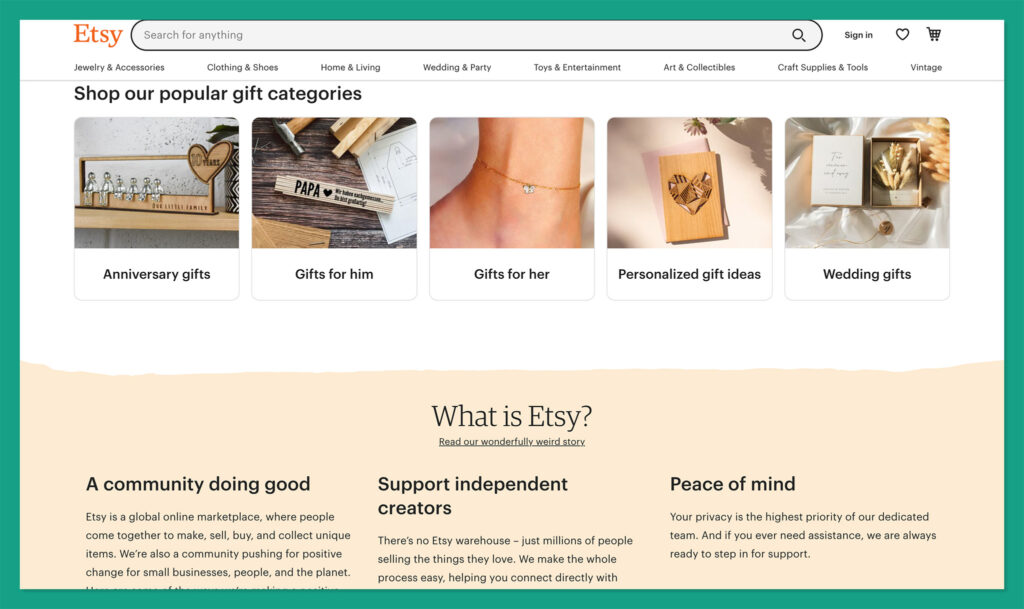Both Ebay and Etsy have a lot to offer today’s online sellers. If you’re looking for a way to start selling online without building and managing your own ecommerce store, both of these tools are ideal for generating profits fast.
They’re easy to use, and ensure you can reach a wide collection of engaged consumers with minimal effort.
However, each platform has a slightly different purpose.
Today, we’re going to look at the features, fees, pros, and cons of both Ebay and Etsy, to help you make the right decision as you begin selling online.
What is Etsy?

Let’s start with the basics: what is Etsy?
Simply put, Etsy is an online marketplace, specifically designed for creative sellers. With over 95 million active buyers, Etsy makes it easy to find your ideal audience, if you’re selling unique, creative items, such as handmade, custom products, or vintage finds.
Etsy buyers are on the hunt for specialist, distinctive products they can’t find elsewhere.
If you create your own jewelry, clothing, or home décor, Etsy is the place for you. It’s also a great platform for connecting with loyal, long-term customers, as around 40% of the sales on Etsy come from repeat buyers. Entrepreneurs selling handcrafted items can thrive on Etsy.
Etsy Pros and Cons
Pros 👍
- Home to lots of loyal, repeat customers
- Affordable pricing and fees
- Easy-to-use environment for buyers and sellers
- Fantastic for selling hand-made items
- Lots of ways to grow your digital presence
Cons 👎
- Limited branding options
- High shipping fees
- Not as many product categories as Ebay
What is Ebay?

Ebay is also an online marketplace, but it caters to a different demographic. When buyers flock to Ebay, they’re often on the hunt for well-known products, available at a lower price.
Customers come to Ebay to find deals, often opting for used or pre-owned products to keep fees low. Ebay’s marketplace allows users to take part in auction-based sales, or purchase items outright.
Unlike Etsy, Ebay gives companies and sellers the option to sell mass-produced goods, and focuses on everyday items, rather than handmade solutions.
It’s home to around 159 million active users worldwide, and supports the sale of virtually any solution from a range of product categories. However, new sellers will need to work hard at developing a top rated store.
Ebay Pros and Cons
Pros 👍
- Large, global audience of interested buyers
- Multiple ways to sell (auction and direct sale)
- Wide range of categories to choose from
- Support with shipping and refunds
- Easy to use environment for buyers and sellers
Cons 👎
- Can be difficult to build a brand
- Lots of competition
- Can be hard to make a profit
Ebay vs Etsy: The Key Differences
Both Etsy and Ebay give retailers and everyday people the opportunity to sell a range of products online, without having to worry about building and hosting an online store.
However, they serve a very different purpose. Primarily, Ebay is best suited to individuals looking to sell used and low-cost products across categories like health and beauty, phones and accessories, and video games.
Etsy, on the other hand, focuses on unique and creative items, including products made from scratch, arts and craft supplies, jewelry, and accessories.
Let’s take a closer look at some of the core differences between Ebay and Etsy.
Etsy vs Ebay: Ease of Use
The good news for budding retailers, is both eBay and Etsy are relatively simple to use. Each platform has a streamlined, user-friendly setup process, intended to get your products listed, and ready for sale as quickly as possible. You don’t even need any coding or design knowledge to get started.
When you create an account on Etsy, all you need to do is enter a store name and upload a couple of products, with descriptions and images.
Etsy walks you through the process of adding descriptions, shipping information, and more with step-by-step instructions and templates. You’ll also have access to a Seller Handbook, where you can find tips on increasing your sales.
While Etsy requires you to fill in some basic account information before you start listing products, Ebay gives you the option to sell with nothing but an email address. You can even create accounts using your Facebook, Apple, or Google details.
Listing products on Ebay is quick and simple. You can search for similar products to determine exactly how you’re going to price your items.
Plus, you can import information from other listings if you want to save some extra time. However, you will be responsible for ensuring your products reach the right customers, with high-quality images, and relevant keywords in your titles.
Etsy vs Ebay: Fees and Costs
One of the most important things you’ll need to consider when choosing between Etsy and Ebay for online sales, is the price you’ll be paying for your listings. The pricing structure for Ebay is a little more complicated than Etsy because there are more conditional components to consider.
Selling Fees
Let’s start by looking at the seller fees. Etsy fees are broken down into two sections, a listing fee and renewal fees.
Product listings on Etsy will automatically expire after 4 months, so you’ll pay $0.20 to initially list an item, and another 20 cents every time you renew your listing.
You won’t have to pay any extra fees if you want to add your listings to an Etsy Pattern store (the Etsy website building platform). However, there is a fee ($15) for using the Pattern service each month. On the plus side, listing products exclusively on a Pattern store won’t cost you anything.
Whenever you sell your products on Etsy, you’ll pay a transaction fee, which is deducted from the overall profit you make.
Usually, you’ll pay around 5% per sale plus a payment processing fee, which can vary depending on the payment method you use, and the country you’re located in. In the USA, for instance, you’ll pay 3% of your total sales, plus 25 cents.
An Etsy seller with a good reputation can also take advantage of the Etsy Plus subscription service, for $10 per month. This allows you to create your own domain name, and use more customization tools on your online store.
Ebay’s costs start with an insertion fee of $0.35 for each item you list on your store. This fee lasts for 30 days, and you’ll be charged again if you need to renew.
There’s also a “final value fee”, which is a commission Ebay takes from each sale, based on the final price, including all shipping and handling costs, but not your sales tax.
If you want to create an online store for selling items, there are monthly or annual subscription fees to pay, which vary depending on the type of listings published, and your number of items.
Your Ebay fees can be paid automatically, or as a one-time payment. A starter store will cost $4.95 per month, while a Basic Store costs $21.95 per month.
Other options include:
- Premium store: $59.95 per month
- Anchor store: $299.95 per month
- Enterprise store: $2,995.95 per month
Advertising fees
If you want to boost your chances of customers finding you on Ebay or Etsy, small businesses can also take advantage of a handful of advertising options. You’re not required to pay these fees, and can use other advertising methods if you prefer.
Etsy offers both in-platform and off-site advertising options. You’ll pay for on-site ads based on a daily budget you set in your seller account. The default minimum daily budget is $1, and you’ll pay every time someone clicks on one of your products.
Etsy’s offsite ads allow you to promote your products on social media channels and search result pages, across Google, Facebook, Instagram, and so on.
If you may less than $10,000 per year, you’ll be charged 15% on the total earnings you make from your off-site ads. If you earn more than $10,000 per year, this fee decreases to 12%.
Similarly, Ebay provides Etsy with two advertising options: brand advertisements and promoted listings. You can choose your ad rate on the platform, based on a percentage of your overall listing’s price.
Ebay’s ads are therefore a little less risky than Etsy’s ads, as you know exactly what you’re going to be paying up-front.
Additionally, sellers on Ebay are only charged for their advertising strategies when a customer purchases a promoted product within 30 days of clicking on an ad.
Ebay vs Etsy: Seller Tools
The tools available to help sellers thrive on Ebay and Etsy are a little different too.
For instance, Etsy gives you access to a simple environment, where you can access support from a community of existing sellers, and leverage a range of resources, such as the Digital Seller Handbook.
There are very community forum solutions to check out, plus an Etsy app where you can manage your listings on the move, without having to log onto a computer.
Etsy will also allow you to take advantage of third-party integrations with existing marketing tools, and ecommerce platforms. You can even leverage solutions for email and social media marketing, and image processing.
Ebay provides merchants with a few more seller tools overall, to help you optimize your business, track your performance, and improve customer satisfaction.
There’s an Ebay app for managing your store on the move. Plus, a seller hub allows you to monitor performance, analyze profits, and even create discounts or coupons for customers.
Ebay offers access to sales reports, to track the main drivers of your sales, and ensure you’re making the right promotional decisions.
Plus, selling manager tools allow you to track your inventory, access reports on sales activities, and automatically schedule listings for unsold items.
Ebay vs Etsy: Shipping
Finally, let’s take a look at your shipping options for Ebay and Etsy. Both of these platforms make it as simple as possible to get your items to customers in a short space of time. You can also choose to leverage your own shipping methods with outside parties.
Shipping on Etsy is usually cheaper than shipping directly, thanks to discounted postage labels for carriers like FedEx, USPS, and Canada Post.
There are tools for calculating postage, shipment tracking, and handling customs. However, Etsy isn’t designed for dropshipping, so it’s very difficult to connect with external third-parties if you want to sell goods through them.
Ebay also makes it relatively simple to manage shipping. You’ll have access to shipping labels you can print at home, free co-branded shipping supplies, and calculators to estimate the costs of shipping through various suppliers.
You can also offer buyers flat rates, discounts, and free shipping. Ebay even supports dropshipping, to help you streamline your fulfillment process.
Etsy vs Ebay: Which is Best?
Ultimately, choosing between Etsy and Ebay for online selling means thinking about your overall business strategy, as well as the fees you’ll pay. If you’re selling vintage items, handmade items, or other unique products, Etsy is a great choice.
You’ll be able to reach your ideal customer base easily with your Etsy shop, and connect with potential customers through Etsy ads.
The shipping costs are relatively low, and you can even enhance your online business by creating an Etsy store using the Pattern service.
If you’re looking to sell second-hand items, or products with a low sale price, an Ebay store might be the right choice. As an Ebay seller, you’ll be able to take advantage of free listings, and leverage a number of tools to make sales easy.
Remember, both Etsy and Ebay, like Amazon and other marketplaces, can connect with existing stores created on Wix, Shopify, and WordPress.
Whether you’re selling mass-produced items, or handmade goods on either platform, it’s worth considering a multi-channel approach to increase revenue.




Comments 0 Responses